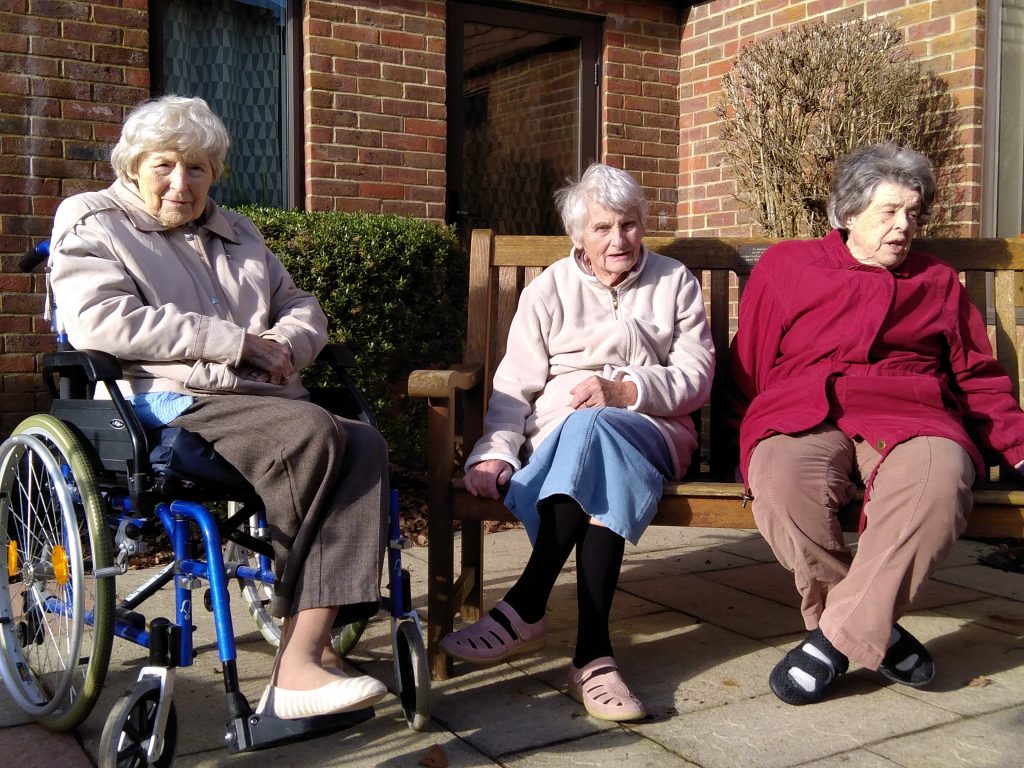How Much Do Care Homes Cost?

As an aging population, the demand for care homes in the UK is rapidly growing. However, this upward trend is accompanied by an increase in care costs. The expense of care leaves many individuals uncertain about whether they can afford care home fees for themselves or their loved ones.
In this blog, we discuss the typical fees for care homes in the UK, what services are typically covered by these care home fees, and explore the various financial options available to individuals and families in need of support services.

Care Home Fees in the UK
Care homes and nursing homes across the UK will all have different fee structures. The costs will depend on the type of care service being provided, the available activities and facilities, as well as any additional services offered to residents.
Most care homes require a fixed rate payment on a weekly or monthly basis, while others may have a pay-as-you-go structure. The fees for most residential care homes cover the essentials such as personal care, accommodation and meals. However, additional personal services like physiotherapy and hair appointments are usually charged separately. Some care homes may have an all-inclusive offering which is normally more expensive due to everything being included instead of charging for services separately.
What are the Average Care Home Costs in the UK
Recent research done by carehome.co.uk suggests the average cost of care homes in the UK range from £27,000 to £39,000 per year for residential care, which is the most standard form of care. However, if an individual requires more advanced care due to high dependency or complex conditions, such as nursing care or dementia care, the costs will be higher.
The price of care will also be affected by the location of the home. Care homes and nursing homes located in the South of England, especially London, tend to be more expensive compared to those in the Northern regions. Each care home will provide different services and amenities, so it is crucial to explore the different options in your preferred location. By comparing costs, care options, and facilities offered by different care homes, you can make a well-informed decision to help you finalise your choice.
Residential Care Costs
Residential care is the perfect choice for individuals who need extra assistance with daily activities like dressing, washing, and mobility, as well as for those who are unable to independently manage their own household. It is also ideal for those who can mostly lead an independent life but may be seeking the companionship that group living offers.
Residential care expenses include accommodation, meals and other refreshments, personal care and activities, and is a great option for those who want to be independent in their own environment but receive additional help when and when needed.
Nursing Care Costs
In the United Kingdom, nursing homes generally cost more compared to residential care homes due to the additional care needed. When you receive nursing care, your care will be provided to you by a registered nurse instead of a care assistant. The cost of nursing care will still include accommodation, meals, activities, and personal care but also includes 24-hour support from a medical professional.
Dementia Care Costs
Dementia care is a special service for individuals living with dementia. In the UK, there are currently 900,000 people with this condition and it is anticipated that this number will continue to rise in the coming years. As dementia cases increase, the cost of this care service also has increased. Like nursing care, dementia care tends to be more costly than residential care due to the specialised training required by care staff in order to provide appropriate support due to the complex condition.
Respite Care Costs
When families look into care, many begin with respite care. Respite care offers short-term relief from caregiving responsibilities and is often sought as a means of taking a much-needed break. It is also provided to those who may need a short-term care solution following an illness or injury, to help them get back on their feet. Many people initially opt for respite care as a trial and as health issues progress, move on to long-term care. Due to the nature of this care service, fees are typically paid at a weekly rate, as respite care can last from several weeks to months.

What is Included in Care Home Fees
As previously mentioned, the cost of a care home varies based on a number of factors such as location, the care service being provided, and the available facilities. The standard fees generally encompass accommodation, meals, personal care, and activities. In cases where nursing care is required, more complex medical support is also included.
It's worth noting that certain care homes may charge additional fees for certain services. Therefore, it is essential to enquire and compare these details with other care homes in your desired area. Some care homes have an all-inclusive approach to resident living, where the fees cover all care services, facilities, activities, and excursions. This ensures transparency and eliminates concerns about hidden costs.
What is an All-Inclusive Care Home?
Choosing an all-inclusive care home has gained popularity amongst individuals looking to move into a care home setting. Despite higher fees, many care seekers find this type of care home more appealing due to having the services, amenities, and activities all included in costs. Residents experience peace of mind knowing that they can enjoy all the available services and facilities without having to think about additional costs, thereby enhancing their overall quality of life.
Given the ongoing cost of living crisis in the UK, moving to an all-inclusive care home offers older individuals the advantage of receiving comprehensive care, support, meals, and amenities without the concerns of fluctuating food prices and rising energy bills that they may face when living at home.
When searching for an all-inclusive care home, it is vital to find one that aligns with the individual's specific care and wellbeing requirements. For instance, if a family member has advanced dementia, it is important to select a care home that is capable to provide the right levels of care to meet their specific needs. Some care homes may only cater to individuals with low-level dementia, so finding the right match is crucial.
Paying for Care
When someone moves into a care home or nursing home, it is normally the responsibility of the individual receiving care or their family to pay for the service. This is often referred to as 'self funding'. However, not everyone has the means to cover the costs of personal care on their own. Individuals who are unable to afford care home fees have the option to seek financial assistance from their local authority or the NHS, which is commonly known as NHS Continuing Healthcare.
What Financial Support Can You Get To Help Pay For Your Care Home Fees
Getting financial support from your local authority or the NHS is dependant on an individual's circumstances and each situation is assessed independently. The most common form of funding support is through your local authority. When someone is requesting local council funding, a financial assessment is carried out to evaluate an individual's income and assets to determine if someone falls above or below the funding threshold - this is called a means test.
If an individual has complex medical needs they may be eligible for NHS Continuing Healthcare (CHC) funding. To qualify for this kind of support, the person who requires care will need to undergo an assessment by a multidisciplinary team (MDT). This assessment does not take into account a person's savings or assets as it is not means-tested.
It is important to remember that local authority funding and NHS Continuing Healthcare is dependent on certain circumstances and if you do not qualify for this support, there are other options you can choose from if you still require financial help. Deferred payment agreements can cover the cost of care for individuals who are unable to pay for their care home fees. Under this agreement, your local authority will provide you with a loan and once assets have been sold, such as a home, the proceeds would then be used to repay your local authority. Like most loans, there is interest added on top of the original loan.
Financial assistance for care is not always guaranteed and some care homes may not accept any form of government funding. Prior to visiting a care home, it is advised that you find out what types of funding the home accepts, if any, with the Home Manager.
NHS Funded Nursing Care
Individuals with complex health needs have the possibility of receiving NHS-funded nursing care which is known as NHS Continuing Healthcare (CHC). This support covers the complete personal care expenses of nursing home care or nursing care within a care home.
To determine eligibility for NHS funding, a comprehensive care needs assessment is conducted by a multidisciplinary team. This assessment considers various aspects of a person's healthcare needs. Individuals living with physical and/or mental disabilities, terminal illnesses, or severe health conditions are often among those who qualify for NHS funding.
Self Funding your Own Care Costs
If you are able to cover your expenses for your own care, you are known as a self-funder. This means that if you have an income or assets exceeding a certain threshold, you will be responsible for financing your own care costs. However, if your care needs escalate and become more severe, you may have the opportunity to apply for NHS-funded nursing care at a later stage.
Moving into a care home is a massive financial obligation for an individual, which needs to be well thought out to ensure that you are able to pay for the fees incurred by your care. It is recommended that. self-funding individuals consult a financial advisor.
Introduction of the Care Home Fees Cap 2025
The UK government has recently announced plans to introduce a care home fee cap, which will take effect from October 2025. Under this cap, the maximum amount an individual will be required to pay towards care home fees throughout their lifetime will be £86,000. This cap will cover the essential expenses of care home services, including personal and medical care. However, it should be noted that accommodation, energy bills, and meals are not included.
The primary objective of implementing this fee cap is to provide reassurance to individuals in need of long-term care and their families. It ensures that individuals can retain more of their personal funds over their lifetime, rather than having to exhaust them entirely on care home fees once the cap limit is reached. It's important to understand that the cap also does not cover any additional services or amenities that some care homes may offer, such as specific activities, outings, transportation, or salon services.



About Our All-Inclusive Care Home
Oakdene Care Home is a luxury care home in Wimborne Minster which boasts a number of first-class facilities. We provide a home away from home for our residents and a warm, loving, and supportive environment.
Our residents receive the highest standards of Residential Care, Dementia Care, Respite Care, and Palliative Care. We have a dedicated team of care professionals that work tirelessly to ensure our residents feel safe and supported 24/7. We have created a homely environment where residents are encouraged to personalise their rooms and continue doing the thing they love.
Our activities coordinator creates a varied activities programme that our residents help put together with their ideas and hobbies. Our aim at Oakdene Care Home is to increase our resident's overall wellbeing and we will always support them to be physically and mentally active and to have the highest quality of life.
Find Out More About Oakdene Care Home
To speak to one of our dedicated team members to find out more about our home, get in touch with us today.





